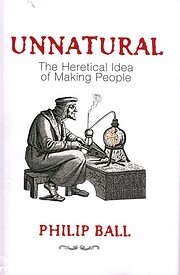|
|
Lädt ... Unnatural: The Heretical Idea of Making People (2011)| 63 | 1 | 416,416 |  (3.71)
(3.71) | Keine | * Can we make a human being? * That question has been asked for many centuries, and has produced recipes ranging from the homunculus of the medieval alchemists and the clay golem of Jewish legend to Frankenstein's monster and the mass-produced test-tube babies in Brave New World. * All of these efforts to create artificial people are more or less fanciful, but they have taken deep root in Western culture. They all express fears about the allegedly treacherous, Faustian nature of technology, and they all question whether any artificially created person can be truly human. Legends of people-making are tainted by suspicions of impiety and hubris, and they are regarded as the ultimate 'unnatural' act - a moral judgement that has its origins in religious thought. * In this fascinating and highly topical study, Philip Ball delves beneath the surface of the cultural history of 'anthropoeia' - the creation of artificial people - to explore what it tells us about our views on life, humanity, creativity and technology, and the soul. From the legendary inventor Daedalus to Goethe's tragic Faust, from the automata-making magicians of E.T.A Hoffmann to Mary Shelley's Victor Frankenstein - the old tales and myths are alive and well, subtly manipulating the current debates about assisted conception, embryo research and human cloning, which have at last made the fantasy of 'making people' into some kind of reality.… (mehr) |
▾Empfehlungen von LibraryThing ▾Diskussionen (Über Links) Keine aktuelle Diskussion zu diesem Buch. ▾Reihen und Werk-Beziehungen ▾Auszeichnungen und Ehrungen
|
|
| Gebräuchlichster Titel |
Die Informationen sind von der italienischen Wissenswertes-Seite. Ändern, um den Eintrag der eigenen Sprache anzupassen. | |
|
| Originaltitel |
|
| Alternative Titel |
|
| Ursprüngliches Erscheinungsdatum |
|
| Figuren/Charaktere |
|
| Wichtige Schauplätze |
|
| Wichtige Ereignisse |
|
| Zugehörige Filme |
|
| Epigraph (Motto/Zitat) |
|
| Widmung |
|
| Erste Worte |
Die Informationen stammen von der englischen "Wissenswertes"-Seite. Ändern, um den Eintrag der eigenen Sprache anzupassen. We know, of course, how to make people.  | |
|
| Zitate |
|
| Letzte Worte |
Die Informationen stammen von der englischen "Wissenswertes"-Seite. Ändern, um den Eintrag der eigenen Sprache anzupassen. | |
|
| Hinweis zur Identitätsklärung |
|
| Verlagslektoren |
|
| Werbezitate von |
|
| Originalsprache |
|
| Anerkannter DDC/MDS |
|
| Anerkannter LCC |
|
▾Literaturhinweise Literaturhinweise zu diesem Werk aus externen Quellen.  Wikipedia auf Englisch (1) Wikipedia auf Englisch (1)
▾Buchbeschreibungen * Can we make a human being? * That question has been asked for many centuries, and has produced recipes ranging from the homunculus of the medieval alchemists and the clay golem of Jewish legend to Frankenstein's monster and the mass-produced test-tube babies in Brave New World. * All of these efforts to create artificial people are more or less fanciful, but they have taken deep root in Western culture. They all express fears about the allegedly treacherous, Faustian nature of technology, and they all question whether any artificially created person can be truly human. Legends of people-making are tainted by suspicions of impiety and hubris, and they are regarded as the ultimate 'unnatural' act - a moral judgement that has its origins in religious thought. * In this fascinating and highly topical study, Philip Ball delves beneath the surface of the cultural history of 'anthropoeia' - the creation of artificial people - to explore what it tells us about our views on life, humanity, creativity and technology, and the soul. From the legendary inventor Daedalus to Goethe's tragic Faust, from the automata-making magicians of E.T.A Hoffmann to Mary Shelley's Victor Frankenstein - the old tales and myths are alive and well, subtly manipulating the current debates about assisted conception, embryo research and human cloning, which have at last made the fantasy of 'making people' into some kind of reality. ▾Bibliotheksbeschreibungen Keine Bibliotheksbeschreibungen gefunden. ▾Beschreibung von LibraryThing-Mitgliedern
| Zusammenfassung in Haiku-Form |
|
|
Aktuelle DiskussionenKeine Google Books Google Books — Lädt ... |




 )
) Google Books — Lädt ...
Google Books — Lädt ... (3.71)
(3.71)